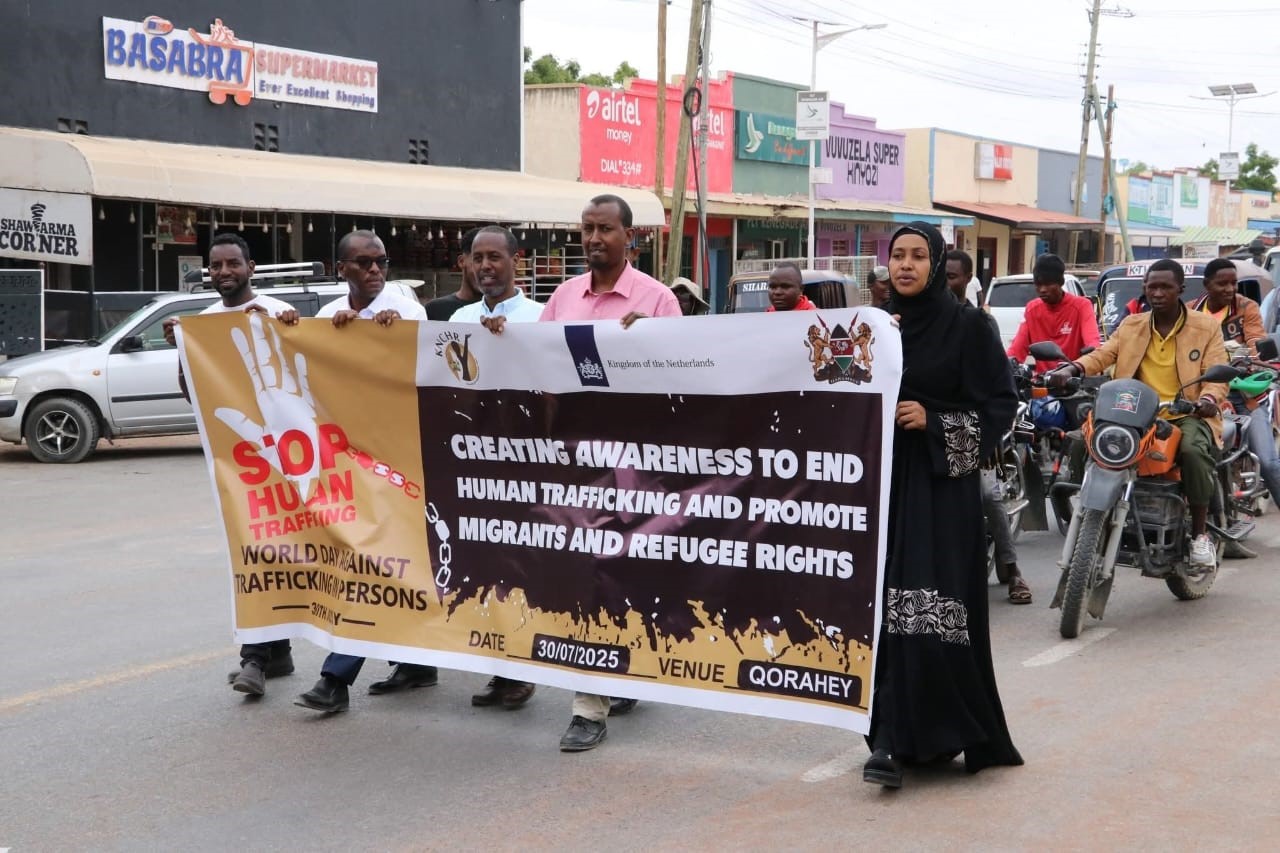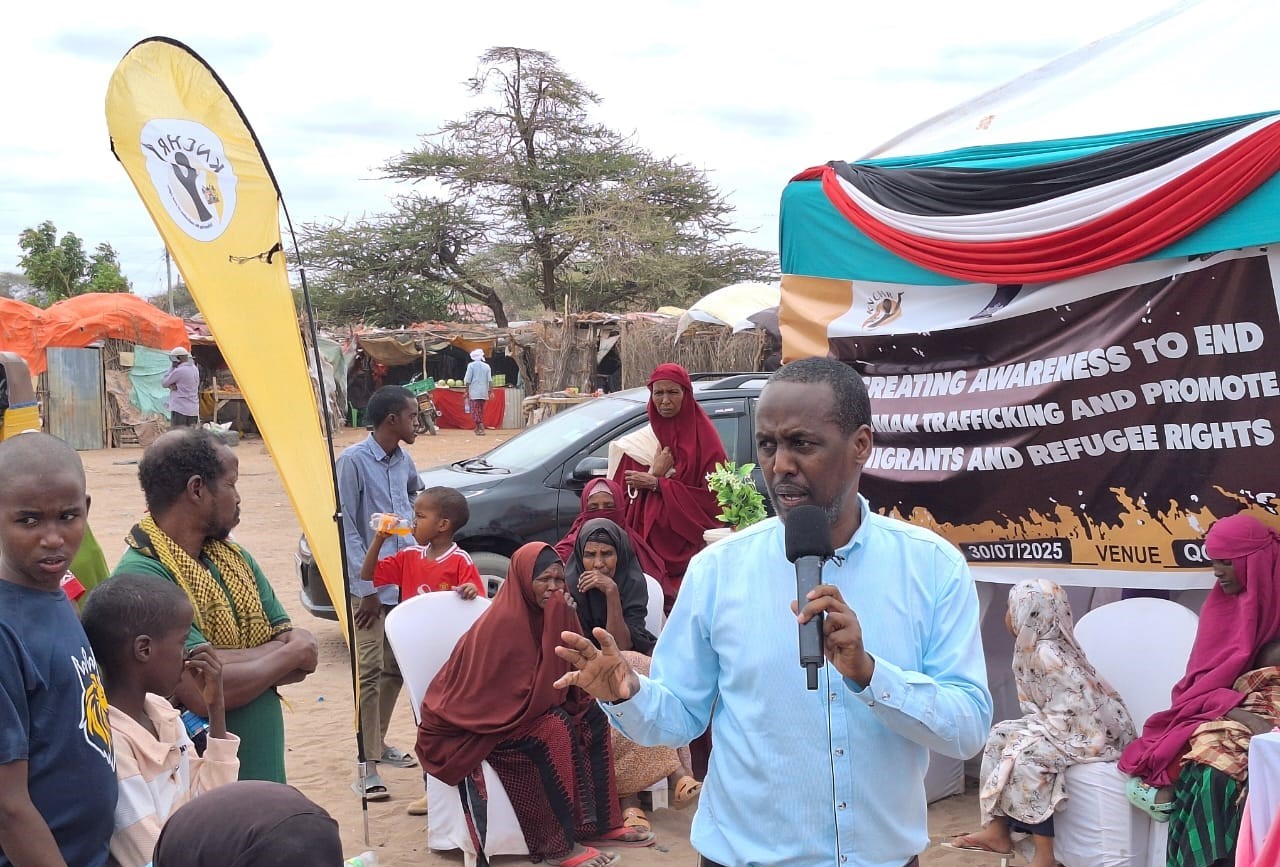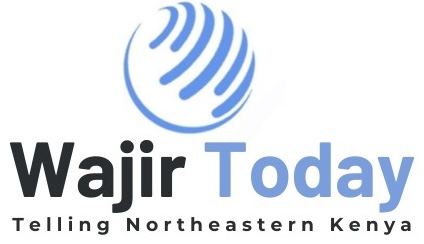
By Abdullahi Jamaa | Wajir Today
As residents of Wajir observed the World Day Against Trafficking in Persons, the wailing of one mother reverberated the urgent need to scale up the war against human trafficking.
The cries of Ms. Fatuma (Not her real name) , mother to 15-year-old Abdi (Not his real name), sent shivers down the spines of many who gathered at Orahey grounds in Wajir town to mark the international day.
Ms. Fatuma stormed the event, pleading for help from well-wishers, community members, and government agencies to trace her son, a grade seven student who has been missing for several days.
“We are searching for him. We are suspecting that he has been trafficked. I am now seeking for help at least to know the whereabouts of my child,” said Ms. Fatuma while sobbing.
Abdi is the latest suspected victim of human trafficking in Wajir, a town that has recently seen a worrying rise in the number of youths ending up in Libya and later trafficked to Europe in search of perceived well-paying jobs.
Wagberi, one of the largest and oldest neighbourhoods in Wajir, has become the epicentre of the rising cases, where an unspecified number of youths have been recruited to undertake the dangerous journey to the lawless North African country, now a global hub for human trafficking.
Ms. Fatuma is not the only mother missing a child in Wajir. Like her, many parents are seething with anger and frustration, unable to raise the huge ransoms that traffickers in Libya often demand before releasing their victims to proceed with their journeys to Europe.
The alarming trend is the reason the regional office of the Kenya National Commission on Human Rights (KNCHR) used the occasion to mobilise local stakeholders, including community leaders, women leaders, human rights advocates, and government officials to raise awareness about the impact of the transnational crime.
During the event, speakers called for a united response to the social and economic consequences of trafficking, which has become one of the most pressing issues facing jobless youth in Wajir County.
“We used to hear about Tahrib (trafficking) affecting neighbouring Somalia. We used to hear those stories in TikTok and other social media platforms but now it is here with us,” Hajir Khalif, a local resident, told the public.
Traffickers are becoming more brazen, now targeting school-going teenagers and luring them with promises of lucrative jobs, even before they complete their studies. It’s a new trend that deeply worries many parents.
Football fields and tea joints in Wajir town have been identified as likely recruitment centres, where idle youth often gather to pass the time.
“The youths are moving in large numbers. They are now recruiting each other. The victims are mostly coming from poor families. Parents are struggling to raise ransoms, some seeking to sell their plots,” said Ms. Halima Hassan Gure.
Ms. Halima also pointed to poor parenting as a contributing factor in the increasing cases. She noted that many parents are out of touch with the reality of trafficking and unaware of their children’s movements and activities.
“As parents we are contributing to this problem because we are not aware of the affairs of our children. We need to protect our teens and be aware of their movements.”
Tired Parents
Many residents say they are tired and impatient with the growing number of ransom payments made every day to traffickers in Libya. It is estimated that about Ksh. 2.3 million is paid per victim, often raised through community contributions.
“The problem of trafficking is getting out of control,” says a worried Ismail Hulbale, a resident of Wajir.
While the economic burden is deeply felt, calls for urgent action to end the organised crime are growing louder, as more and more young people fall victim.
“We need to address this problem and that is why we are here. It has affected all of us, every person, every home and every clan,” said Hashim Elmoge, an advocate of the High Court of Kenya, who called for a stronger collaborative approach.
“We need to address this problem like the way we address local political issues. We are here to collaborate and cooperate against human trafficking. Let’s mainstream this awareness and do it at every meeting,” Elmoge urged.
Awareness campaign

Community members and leaders used the day to urge youth to rethink their outlook and seize local opportunities to better their lives.
“We encourage youth to take advantage of local vocational colleges and enroll themselves to acquire skills that can make them self-employed,” said Waberi Ward Member of County Assembly Aden Bulle.
The national government, represented by Deputy County Commissioner for Khorof-Harar Mr. Musa Okango, was asked to activate security agencies and increase surveillance to curb the rising trend.
“We ask the government to make efforts and nap agents involved in the recruitment of youth,” appealed the Wagberi MCA.
Mr. Okango and his team pledged to step up security operations while calling on parents to play a more active role in safeguarding their children.
“We are here to collaborate with the public to address the problem of trafficking. To parents, give your children guidance and values. We need to increase awareness about the negative impact of trafficking,” Mr. Okango noted.
Meanwhile, the Regional Coordinator of KNCHR Mr. Hassan Abdi Omar urged parents to stay vigilant and take extra caution to protect their children from traffickers.
“Human trafficking is a violation of human rights and it is rampant in Wajir. We are losing a whole generation of youths. We need to be vigilant. I want to urge parents to be very vigilant,” Mr Omar told the crowd as the curtains fell on the World Day Against Trafficking in Persons.

